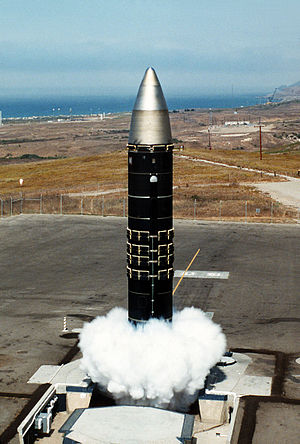
The LGM-118 Peacekeeper, also known as the MX missile (for Missile-eXperimental), was a land-based ICBM deployed by the United States starting in 1986. The Peacekeeper was a MIRV missile that could carry up to 10 re-entry vehicles, each armed with a 300-kiloton W87 warhead in a Mk.21 reentry vehicle (RV). A total of 50 missiles were deployed starting in 1986, after a long and contentious development program that traced its roots into the 1960s.
MX was designed to allow the US to ride out a sneak attack by the Soviet ICBM fleet and then launch a counterattack. In order for the counterattack to be effective, MX had to have three qualities; the ability to be rapidly re-targeted so it would only be attacking those Soviet missiles known to still be in their silos, enough accuracy to allow a small warhead to kill an enemy silo so more warheads could be packed on a single MX missile, and a basing system that meant enough of the missiles would survive an attack that the counterattack would be effective. Among these three, the basing issue remained an unsolved problem and the subject of much criticism during the MX's development.